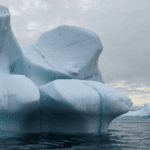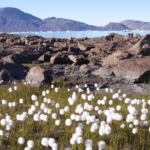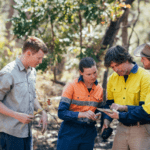I grew up on the northern shores of Lake Superior, nowhere near the ocean. The closest coastal community was well over 700 kilometres north, on Hudson’s Bay. I have lived inland for most of my life, yet still feel deeply connected to the sea. When I was a kid, my love for the ocean came from one of the only resources available: a good book. Already a keen, nature-loving seven year old, I dove straight into a fascinating series on Canada’s endangered animals put out by OWL magazine in the early 1990’s. Clearly influenced by my favourite Raffi song at the time, Baby Beluga, I was instantly fascinated with one book in particular about St. Lawrence beluga whales. Since then, I have become a marine biologist and a science communicator on a mission to engage others in ocean science, much like that great book once did for me.
Surrounded by three coasts, Canada is home to a wide breadth of marine biodiversity ranging from the inspiring Atlantic St. Lawrence beluga whale, to the wild Pacific salmon and iconic Arctic polar bear. The ocean is the source of, and provider to all life on Earth, including our own. Covering over 70% of our planet, our lives depend on its continued health and protection. But how many of us truly understand the importance of the ocean? How many of us are ocean literate?
Ocean literacy refers to the understanding of the interdependence between humans and the ocean. Being ocean literate means being aware of fundamental ocean facts, being able to fully understand and communicate them, and use them to make informed decisions about the ocean and its resources. Several organizations in the U.S. have come together over the last decade and created essential principles and fundamental concepts that people must understand in order to be ocean literate. These seven essential principles are as follows:
- The Earth has one big ocean with many features.
- The ocean and life in the ocean shape the features of the Earth.
- The ocean is a major influence on weather and climate.
- The ocean makes the Earth habitable.
- The ocean supports a great diversity of lifeand ecosystems.
- The ocean and humans are inextricably interconnected.
- The ocean is largely unexplored.
Although these seven principles were formed with K–12 school curricula in mind, they were created to help all people better understand ocean science. They were developed for educators to use in school programs, for public outreach and engagement, science communication, and policy-making by government and other organizations. It is essential that citizens improve their level of ocean literacy in order to establish a greater push for marine protection and conservation. These fundamental concepts are universal, and can be used around the world, including in Canada. Lucky for us, the Canadian Network for Ocean Education (CaNOE) is a group that brings together like-minded ocean enthusiasts to promote and increase ocean literacy in Canada. By sharing current events, connecting educators with ocean science resources, and stimulating discussion and science communication, CaNOE is helping Canada keep up with international efforts and become a more ocean literate nation.
The school programs I grew up with didn’t include ocean science and many of them still don’t. This is a significant gap in ocean literacy initiatives in Canada and it must change for the better. But it’s important to remember that there are many other ways to engage young and adult learners about the marine environment besides formal institutions like school. Informal learning opportunities can also provide that much needed ocean connection, especially for those of us who don’t live near the ocean. By informal learning opportunities I mean educational experiences that occur outside school and work. Examples could include visiting aquariums, zoos, science centres and museums, and accessing media such as books, movies, blogs and social media platforms. Extracurricular learning opportunities like these are key contributors for improving ocean literacy as they make up a large part of lifelong learning.
Many learning opportunities are rapidly growing and changing, particularly with the seemingly infinite array of digital media available on the internet. Due to the accessible and ubiquitous nature of the internet through recent immersion of mobile devices, tablets and laptops, it is now possible to create a highly connected learning experience for anyone around the world and bring them into the exciting world of marine science. For example, if you were interested in knowing more about tropical reefs, you could easily do so from the comfort of your own home. You could simulate a SCUBA dive using Google Street View Treks or dive deeper into the subject through David Attenborough’s Great Barrier Reef, an interactive online science communication website put out by the BBC.
With the groundbreaking ocean literacy work happening around the world, the opportunities for engaging the public in marine science are continuously evolving. I’ve put together some specific examples, conferences and resources for educators and science communicators to help others become more ocean literate.
Blogs:
- David Suzuki Foundation Healthy Oceans Blog
- The Marine Detective
- Southern Fried Science
- Hakai Magazine
- The Pacific Underwater Calendar
- National Geographic Ocean Views
- WWF-Canada Oceans Blog
Ocean Education Resources:
- Colorado Ocean Teaching Tools
- Monterey Bay National Marine Sanctuary
- National Geographic Ocean Education
- COSEE Resources
- Fish Eye Project
- David Suzuki Foundation Ocean Activity Kit and Ocean Celebration Kit
- NOAA Education Resources
- DFO Stream to Sea Program
Upcoming Conferences:
- NMEA Conference 2016– Making Waves – Current Connections in Marine Science, June 25-July 1, 2016 – Orlando, Florida
- IMCC4– Making Marine Science Matter, St. John’s, Newfoundland July 30-August, 2016
- CaNOE Conference 2016– Ocean Optimism in Ocean Education, June 9-11, Halifax, Nova Scotia
There is still an ever-growing need for more ocean education in both formal and informal environments. With so many amazing initiatives, from IMAX movies to YouTube videos, and from blogs to books, I feel optimistic about the future of ocean literacy in Canada and around the world.




